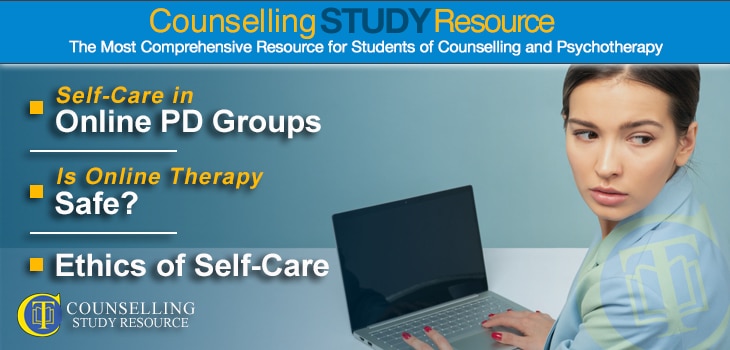165 - Is Online Therapy Safe?
Self-Care in Online Personal Development Groups - Ethics of Self-Care
Episode 165 of the Counselling Tutor Podcast focuses on self-care, with Ken Kelly and Rory Lees-Oakes starting off by discussing self-care in online personal development (PD) groups.
'The Digital Counselling Revolution' then looks into the question 'Is online therapy safe' and gives ways to ensure personal safety during sessions.
Finally, in 'Practice Matters', the presenters discuss the ethical importance of good self-care.
Self-Care in Online PD Groups (starts at 1.25 mins)
While PD groups have traditionally been a face-to-face phenomenon, the COVID-19 situation has led many now to be conducted online.
Looking after yourself during and after participation in a PD group has always been important, and the online nature of this now raises some additional challenges.
Ken and Rory look at:
- what a PD group is
- how PD groups typically are run
- the purpose of PD groups
- how PD groups link to theoretical learning
- possible gains from participation in a PD group
- potential challenges of PD groups
- how to us self-care to offset these challenges.
In particular, Rory suggests finding your own ‘decompression plan’: just as deep-sea divers have to come back up to the surface slowly, in manageable steps, so it is important to allow yourself time to settle after a PD group, reflecting on the learning about your process that has taken place before you become involved once more in everyday life.
If participating in a PD group online feels daunting to you, do remember that this way of working replicates the way in which much counselling is currently taking place – so your involvement in online PD work is helping to equip you for counselling online.
Is Online Therapy Safe? (starts at 15.45 mins)
Client safety is key in counselling and psychotherapy - and online working opens up a whole new dimension of this.
While the therapy room is quite a protected environment, where you and the client can both see and hear what is happening around you, online or telephone working may involve background sounds in both your and their environments. This may make your clients (or you) wonder, is only therapy safe?
How will they/you know whether these background sounds can be ignored as outside, peripheral noises, or whether they signal a loss of privacy at one or both ends of the therapeutic relationship?
Ken and Rory discuss how to prepare for and deal with this eventuality, supporting clients to develop trust in you and the relationship, and enabling them to signal to you effectively if they need to stop a session before the end.
Issues discussed in answer to the question 'Is online therapy safe?' include the use of a safe word, technology to support privacy, and technology that can threaten privacy.
Rory has created a handout on safety considerations in online therapy, which you can download here. And you might like to check out our course, Online and Telephone Counselling, which:
- has been awarded Quality Checked training recognition by the National Counselling Society (NCS)
- meets the British Association for Counselling and Psychotherapy (BACP) competence framework requirements for practitioners who wish to work with clients via telephone and e-counselling; the course exceeds 80 hours of guided learning, and the learning outcomes are mapped to the BACP competences for telephone and e-counselling.
Counselling Tutor is a recognised Association for Counselling & Therapy Online (ACTO) Online Training Provider, and this course enables the graduate to join ACTO.
The course equips practitioners with the skills, knowledge and abilities to work online and offer services as an online and telephone counsellor, providing that the practitioner already holds a formal recognised counselling qualification.
You can read over 1,000 reviews of the course on our website too.
Ethics of Self-Care (starts at 26.25 mins)
The BACP’s Ethical Framework for the Counselling Professions refers to the importance of self-care (2018: 27):
Care of self as a practitioner
-
- We will take responsibility for our own wellbeing as essential to sustaining good practice with our clients by:
- taking precautions to protect our own physical safety
- monitoring and maintaining our own psychological and physical health, particularly that we are sufficiently resilient and resourceful to undertake our work in ways that satisfy professional standards
- seeking professional support and services as the need arises
- keeping a healthy balance between our work and other aspects of life.
Working online demands more of us than working face-to-face; Ken and Rory explain why this is so, and explore the different aspects of this way of working that contribute to this phenomenon.
The presenters also discuss different forms of self-care, including meditation, mindfulness, walking and sleeping.


